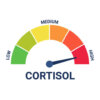
As a gut health practitioner, I often meet clients who struggle with digestive issues without fully understanding the underlying causes. One key factor that frequently comes up in these conversations is cortisol, often referred to as the “stress hormone.”
While cortisol plays a vital role in keeping our bodies functioning optimally, when it is consistently elevated due to chronic stress, it can significantly affect the digestive system. In this blog, I want to explore cortisol’s role in gut health, how it can contribute to digestive disorders, and practical strategies for managing it to support better digestion.
What Is Cortisol?
Cortisol is a hormone produced by the adrenal glands, which sit on top of your kidneys. It is often associated with stress, but its role in the body is much broader. Cortisol helps regulate metabolism, blood sugar levels, immune function, and even blood pressure.
The Role of Cortisol in the Stress Response
When your body encounters a stressful situation—whether physical, emotional, or environmental—cortisol is released as part of the “fight or flight” response. This response is designed to help you react quickly to danger: your heart rate increases, your muscles tense, and energy stores are mobilised to prepare your body for action.
Short-term cortisol release is beneficial and protective. However, chronic stress leads to prolonged cortisol elevation, which can create imbalances in multiple systems, including your digestive system.
How Cortisol Affects the Digestive System
The digestive system is highly sensitive to stress hormones. When cortisol levels are persistently high, the normal function of the gut can be disrupted in several ways.
Impact on Gut Motility and Digestion
Cortisol influences gut motility, which is the movement of food through the digestive tract. High cortisol can either speed up or slow down this process. Some people may experience diarrhoea, while others experience constipation. This is particularly important for individuals with Irritable Bowel Syndrome (IBS), as stress often exacerbates symptoms.
Additionally, elevated cortisol can reduce the production of digestive enzymes, making it harder for your body to break down and absorb nutrients efficiently. Over time, this can lead to bloating, discomfort, and nutrient deficiencies.
Cortisol’s Effect on the Gut Microbiome
The gut microbiome, composed of trillions of bacteria, plays a crucial role in digestion, immunity, and even mood regulation. Research has shown that chronic stress and high cortisol levels can alter the balance of gut bacteria, reducing beneficial species and allowing harmful bacteria to flourish.
This imbalance, known as dysbiosis, can contribute to digestive issues such as bloating, gas, and irregular bowel movements. It may also influence systemic inflammation, linking gut health to overall well-being.
Cortisol and the Release of Stomach Acid
Cortisol also impacts the production of stomach acid, which is essential for proper digestion and nutrient absorption. Elevated cortisol can increase acid production in some individuals, potentially leading to acid reflux or heartburn.
In others, it may decrease acid production, resulting in poor protein digestion and increased risk of bacterial overgrowth. Both scenarios can contribute to digestive discomfort and long-term gut health issues.
The Connection Between Chronic Stress and Digestive Disorders
Prolonged high cortisol levels do more than just cause temporary digestive discomfort—they can set the stage for chronic gut disorders.
How Long-Term High Cortisol Levels Can Lead to IBS
IBS is a common condition characterised by abdominal pain, bloating, and altered bowel habits. Chronic stress is a known trigger for IBS, largely due to cortisol’s effects on gut motility, enzyme production, and the microbiome.
When cortisol remains elevated over months or years, it can sensitise the gut to stress, making symptoms more frequent and severe. This explains why some clients notice flare-ups during periods of high stress, such as work deadlines or personal challenges.
Cortisol’s Role in Inflammation and Leaky Gut Syndrome
High cortisol levels can also influence gut inflammation. Cortisol has anti-inflammatory effects in the short term, but chronic exposure can disrupt immune regulation in the gut. This can contribute to increased intestinal permeability, commonly known as leaky gut.
Leaky gut allows undigested food particles and toxins to enter the bloodstream, which can trigger systemic inflammation and further complicate digestive health. Clients with leaky gut often report fatigue, food sensitivities, and recurring gastrointestinal issues—all of which can be exacerbated by stress.
Managing Cortisol Levels for Better Digestion
The good news is that there are practical strategies to regulate cortisol and protect gut health. While cortisol management is not a quick fix, consistent lifestyle adjustments can make a significant difference.
Stress Management Techniques to Regulate Cortisol
Stress reduction is the cornerstone of cortisol management. Techniques I often recommend include:
· Mindfulness and meditation: Spending even 10–15 minutes a day practising mindfulness can help lower cortisol levels and reduce stress-related gut symptoms.
· Breathing exercises: Slow, deep breathing stimulates the parasympathetic nervous system, promoting relaxation and reducing cortisol release.
· Physical activity: Moderate exercise supports healthy cortisol rhythms, improves digestion, and balances gut microbiota.
· Sleep hygiene: Adequate, quality sleep is critical for cortisol regulation. I encourage clients to establish consistent sleep schedules and create a calming bedtime routine.
· Dietary Changes That Can Help Lower Cortisol
· Nutrition plays a vital role in modulating cortisol and supporting gut health. Consider these dietary adjustments:
· Balanced macronutrients: A diet rich in whole foods, including lean proteins, complex carbohydrates, and healthy fats, can stabilise blood sugar and cortisol levels.
· Gut-supportive foods: Fermented foods, high-fibre vegetables, and prebiotic-rich foods nourish beneficial gut bacteria.
· Limit stimulants: Excess caffeine and sugar can spike cortisol and disrupt digestive balance.
· Anti-inflammatory nutrients: Omega-3 fatty acids, turmeric, and leafy greens can help counteract stress-related inflammation.
By combining mindful eating with stress management practices, you can create a positive feedback loop: lower cortisol supports gut health, and a healthier gut helps regulate stress responses.
When to Seek Medical Advice for Cortisol-Related Digestive Issues
While lifestyle changes are effective for many, persistent digestive issues may require professional support. You should consider seeking medical advice if you experience:
· Chronic abdominal pain, bloating, or changes in bowel habits
· Unexplained weight loss or malnutrition
· Severe acid reflux or heartburn
· Signs of systemic inflammation, such as fatigue or skin issues
A healthcare professional can help assess cortisol levels, evaluate gut function, and develop a personalised plan that may include medical interventions alongside lifestyle strategies.
Conclusion
Cortisol is a powerful hormone that is essential for our survival, but when stress becomes chronic, its effects on the gut can be profound. From disrupting gut motility and altering the microbiome to increasing inflammation and triggering leaky gut, high cortisol levels are often at the root of many digestive complaints.
The encouraging news is that with awareness, stress management, and targeted dietary strategies, it is possible to support healthy cortisol levels and improve digestive function. By taking a proactive approach, you can regain balance, reduce gut-related discomfort, and enhance your overall well-being.
As someone deeply passionate about gut health, I’ve seen firsthand how addressing cortisol can transform digestive health. Remember, small, consistent changes in lifestyle and nutrition can make a significant difference—your gut will thank you for it.
References
- Frontiers in Endocrinology – “Signalling cognition: the gut microbiota and hypothalamic–pituitary–adrenal axis”
- The Journal of Physiology – “The impact of acute and chronic stress on gastrointestinal …”
- University of Western States – “Stress, Digestion, and the Microbiome”
- The Institute for Functional Medicine – “The Impact of Stress on Gut Health”
Last Updated
Uploaded by Martin Cohen on 03/11/2025






